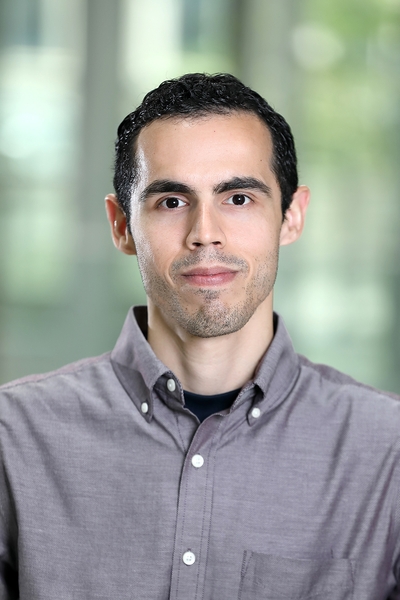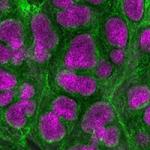
Research Topics
The focus of the Section on Mechanobiology is the development and use of advanced Atomic Force Microscopy (AFM) technologies for cellular and tissue mechanics investigation. We combine and apply diverse multidisciplinary knowledge to investigate the most pressing mechanobiology questions, including high spatio-temporal resolution AFM and confocal fluorescent microscopes, image analysis, and mathematical modeling.
The Section on Mechanobiology seeks to understand several important biological processes by applying physics and engineering principles, particularly: the molecular-mechanical regulation of the actomyosin cortex of melanoma cells; the solid tumor microenvironment for deciphering self-organization in cancer biology; and the anisotropic mechanical properties of developmental and mature inner ear sensory and non-sensory epithelial tissues using a novel noncontact AFM approach.
Additionally, the laboratory develops new AFM methodologies to study fast multiparametric and multidimensional cellular and tissue processes, and advances the state-of-the-art AFM imaging methods for high spatio-temporal and quantitative nanomechanical mapping.
Biography
Dr. Alexander X. Cartagena-Rivera received a bachelor’s degree in Mechanical Engineering from the University of Puerto Rico at Mayagüez in 2010. Then he was a graduate student and research assistant in the lab of Prof. Arvind Raman at Purdue University. He received a Ph.D. in Mechanical Engineering from Purdue University in 2014. He accepted a Post-Doctoral IRTA Fellowship position in the lab of Dr. Richard S. Chadwick in the Section on Auditory Mechanics with the National Institute on Deafness and Other Communication Disorders at the National Institutes of Health in 2014. Dr. Cartagena-Rivera accepted a Tenure-Track Earl Stadtman Investigator position with the National Institute of Biomedical Imaging and Bioengineering (NIBIB) in 2019. He is now chief of NIBIB’s Section on Mechanobiology, where he and his lab staff continue work on understanding cellular and tissue molecular-mechanical regulation and development of advanced atomic force microscopy technologies for cancer biology and hearing research. In 2019 he received the prestigious NIH Distinguished Scholars Program award. His research interests lie in diverse and multidisciplinary fields including biomedical engineering, biophysics, fluid mechanics, soft matter, micro/nanomechanics, hearing mechanics, cellular biology, and living cells and viruses mechanics determined using the atomic force microscope in physiologically relevant conditions. Read more about Dr. Cartagena-Rivera's career in the NIH's Distinguished Scholars stories.
Selected Publications
- Parvini C, Massey A, Mezher M, Cartagena-Rivera AX. Multiplexed Nanoscale Viscoelastic Mapping at Multiple Time Scales of Melanoma Cells as a Label-Free Cancer Biomarker. ACS Nano. 2025;19(32):29109-29121.
- Massey A, Stewart J, Smith C, Parvini C, McCormick M, Do K, Cartagena-Rivera AX. Mechanical properties of human tumour tissues and their implications for cancer development. Nat Rev Phys. 2024;6(4):269-282.
- Babahosseini H, Belyantseva IA, Yousaf R, Tona R, Hadi S, Inagaki S, Wilson E, Kitajiri SI, Frolenkov GI, Friedman TB, Cartagena-Rivera AX. Unbalanced bidirectional radial stiffness gradients within the organ of Corti promoted by TRIOBP. Proc Natl Acad Sci U S A. 2022;119(26):e2115190119.
- Wang S, Matsumoto K, Lish SR, Cartagena-Rivera AX, Yamada KM. Budding epithelial morphogenesis driven by cell-matrix versus cell-cell adhesion. Cell. 2021;184(14):3702-3716.e30.
- Jaumouillé V, Cartagena-Rivera AX, Waterman CM. Coupling of β(2) integrins to actin by a mechanosensitive molecular clutch drives complement receptor-mediated phagocytosis. Nat Cell Biol. 2019;21(11):1357-1369.
Related Scientific Focus Areas

Biomedical Engineering and Biophysics
View additional Principal Investigators in Biomedical Engineering and Biophysics




This page was last updated on Thursday, December 18, 2025